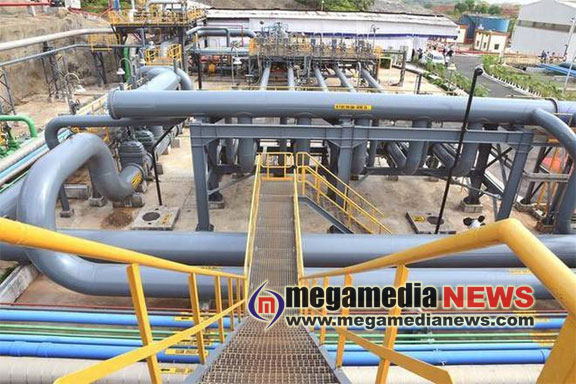‘Mangaluru important for India’s energy sector’
10:01 AM, Friday, May 25th, 2018 Mangaluru: Mangaluru has become very important for the energy sector in the country as it houses oil refining major, Mangalore Refinery and Petrochemicals Ltd., (MRPL), and the crude storage facility, Indian Strategic Petroleum Reserve Ltd., (ISPRL), said Joint Secretary of Ministry of Petroleum and Natural Gas Sunjay Sudhir.
Mangaluru: Mangaluru has become very important for the energy sector in the country as it houses oil refining major, Mangalore Refinery and Petrochemicals Ltd., (MRPL), and the crude storage facility, Indian Strategic Petroleum Reserve Ltd., (ISPRL), said Joint Secretary of Ministry of Petroleum and Natural Gas Sunjay Sudhir.
Mr. Sudhir was speaking after receiving the delivery of first consignment of crude from Abu Dhabi National Oil Company (ADNOC) for storage at ISPRL’s Mangaluru facility here recently.
The two facilities are beneficial to Karnataka and neighbouring States too as they cater to their energy requirements, he noted.
Speaking on the occasion, ISPRL’s Managing Director and CEO H.P.S. Ahuja termed the ISPRL caverns at Permude (Mangaluru), Padur (Udupi) and Visakhapatnam as engineering marvels executed with exact precision. The project is a testimony to the engineering talent of Indians, he said.
Conceived in 2004, ISPRL commenced excavations for caverns at the three places in 2008 to store 5.33 million tonnes of crude —1.33 million tonnes at Visakhapatnam, 1.5 million tonnes at Mangaluru and 2.5 million tonnes at Padur.
A total of 30 km of tunnelling was undertaken to construct the caverns, which are as high as a 10-storey building created at a depth of 60-70m below the mean sea level.
Excavation brought out 220 lakh tonnes of hard rock, the debris of which could fill 43 football fields to a height over 100 ft or alternatively could be used to build a four lane highway from Mumbai to Delhi.
Engineers used more than 3,75,000 cubic metres of concrete and shotcrete, which is more than the concrete used in construction of Burj Khalifa, the world’s tallest building. The total quantum of steel used in the ISPRL project was about . 36,500 tonnes, 40% more than the steel used in Howrah Bridge, Kolkatta.
ISPRL’s Mangaluru facility comprises of two U-shaped compartments. One is already filled with crude through funds from the Centre. The second would hold crude supplied by ADNOC.
Underground storage of hydrocarbons is not only more secure, safe and economical than above-ground storage, but also has several environmental and operational advantages and also have a very low maintenance cost, according to ISPRL.
Simillar Posts
Warning: count(): Parameter must be an array or an object that implements Countable in /home/megamcaq/public_html/wp-content/plugins/post-plugin-library/common_functions.php on line 357
- None Found
Leave a Reply
© Copyright 2008 www.megamedianews.com All Rights Reserved. Privacy Policy








 Posted in
Posted in  Tags:
Tags: 






